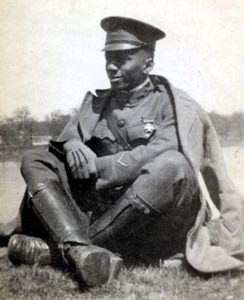
William J. Powell, 1917
This date celebrates the birth of William J. Powell, a Black aviator and businessman, in 1897.
From Henderson, KY, he moved with his family to Chicago when he was eight years old. After graduating from Wendell Phillips High School at the age of 16, he applied to the University of Illinois School of Engineering. He was a top student and musically talented to boot. He interrupted his studies at the University of Illinois to serve in World War I as an infantry lieutenant.
After being badly wounded in a gas attack, he returned to Illinois to finish his electrical engineering degree. He lived with the terrible informal segregation of the North and the strict Jim Crow Laws of the South. In 1934, Powell wrote a thinly fictionalized autobiography, "Black Wings." It recounts how he visited Le Bourget Airfield soon after Lindbergh had landed there, took his first airplane ride, and was deeply moved by the experience. Readers learned how he was rejected by a flying school and the Army Air Corps, but was finally accepted into a Los Angeles flying school in 1928.
By 1932, he was licensed not just as a pilot but as a navigator and an aeronautical engineer. In "Black Wings," he wrote, "I do not ally myself with the Negro who begs a White man for his job. I ally myself with that ... young progressive Negro who believes he has the brain, the ability, to carve out his own destiny."
Powell meant to fly around Jim Crow. The new flight technology seemed to be a way to slip "the surly bonds of earth." Black Americans could build economic independence by seizing the opportunity in the embryonic flight industry. He founded the Bessie Coleman Aero Club and became the first black woman to fly.
In 1931, Powell organized an all-Negro air show for the Club in Los Angeles, which drew 15,000 visitors. Powell built his flying school and shop. Everything he did had a clean, solid quality to it. He wasn't an aerial showman or a dramatic public figure. His book was filled with down-to-earth technical detail. Powell gave that cause its substance, and it's his belief system, as well as a well-honed, bourgeois work ethic.
He died in 1942, perhaps from the after-effects of World War I poison gas. But Powell did live to see his work bear fruit through the Tuskegee Airmen, a Unit of Black fighter pilots. He didn't live to see a world where Black airline pilots, and then Black astronauts, were no longer unusual.
John Lienhard,
The University of Houston,
W.J. Powell, Black Aviator,
(with an introduction by Von Hardesty),
Washington, D.C.:
Smithsonian Institution Press, 1994.
V. Hardesty, and D. Pisano,
Black Wings, Washington, D.C.,
National Air and Space Museum,
Smithsonian Institution, 1984,
(see especially p. 7.)